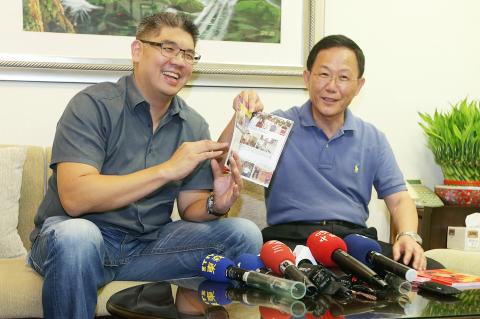With support for the Chinese Nationalist Party (KMT) in local cities and counties dipping following a series of corruption cases involving KMT officials, the party is considering involving its outgoing county and city heads in its inner workings, promising them better positions with the party depending on how they help out in the year-end elections.
Ongoing investigations into potential corruption in an affordable housing project in Taoyuan County’s Bade District (八德) and the Public Works Department of New Taipei City, and alleged bribery involving Keelung Council Speaker Huang Ching-tai (黃景泰), plus the indictment last year of then-Nantou county commissioner Lee Chao-
ching (李朝卿) on corruption charges, have reflected poorly on the KMT.

Photo: CNA
According to party sources, several county commissioners and city mayors have been placed on a watch list by the party due to sliding support ratings.
For example, Changhua County is regarded as an important battlefield, but disputes are getting in the way, the sources said.
KMT Legislator Lin Tsang-min (林滄敏), who won the party primary to run in the year-end Changhua County commissioner election, is reportedly at odds with Changhua County Commissioner Cho Po-yuan (卓伯源), who is said to prefer Changhua County Deputy Commissioner Ko Cheng-fang (柯呈枋) to be his successor, the sources said.
Lin reportedly met with KMT Deputy Chairman Tseng Yung-
chuan (曾永權), the party’s election manager, asking for intervention.
“As long as the battle is won, party central would ‘arrange’ a position,” the source quoted Tseng as saying, adding however that Tseng had also said he could not promise what the position would be.
The same issue has occurred in Miaoli County, where Miaoli County Commissioner Liu Cheng-hung (劉政鴻) is reportedly at odds with KMT Miaoli County commissioner candidate Hsu Yao-chang (徐耀昌) after Liu’s “designated” successor lost the party primary, the sources said.
The KMT’s efforts in Chiayi City has also suffered some setbacks, according to the sources.
During a recent city government event, Chiayi KMT mayoral candidate Chen Yi-chen (陳以真) was asked not to wear a vest with the party logo and her name on it and was denied participation in a ceremonial lifting of a cloth from a plaque, the sources said.
However, Democratic Progressive Party (DPP) candidate Twu Shiing-jer (涂醒哲) wore a DPP vest on stage at the event.
The local campaign office is perplexed at the different standards, and there are voices within the party calling for a notice to be given to KMT Chiayi Mayor Huang Min-hui (黃敏惠), the sources said.
Meanwhile, of the seven county commissioners and city mayors who are to leave their posts after the elections, Taipei Mayor Hau Lung-bin (郝龍斌) is currently not favored within the KMT due to his criticism of President Ma Ying-jeou’s (馬英九) administration’s policies and his support of requests such as medical parole for former president Chen Shui-bian (陳水扁), the sources said.
Huang, on the other hand, currently has the greatest chance to rise in the KMT, but if she fails to hold on to Chiayi City, it would be a large stain on her resume, the sources added.

The CIA has a message for Chinese government officials worried about their place in Chinese President Xi Jinping’s (習近平) government: Come work with us. The agency released two Mandarin-language videos on social media on Thursday inviting disgruntled officials to contact the CIA. The recruitment videos posted on YouTube and X racked up more than 5 million views combined in their first day. The outreach comes as CIA Director John Ratcliffe has vowed to boost the agency’s use of intelligence from human sources and its focus on China, which has recently targeted US officials with its own espionage operations. The videos are “aimed at

STEADFAST FRIEND: The bills encourage increased Taiwan-US engagement and address China’s distortion of UN Resolution 2758 to isolate Taiwan internationally The Presidential Office yesterday thanked the US House of Representatives for unanimously passing two Taiwan-related bills highlighting its solid support for Taiwan’s democracy and global participation, and for deepening bilateral relations. One of the bills, the Taiwan Assurance Implementation Act, requires the US Department of State to periodically review its guidelines for engagement with Taiwan, and report to the US Congress on the guidelines and plans to lift self-imposed limitations on US-Taiwan engagement. The other bill is the Taiwan International Solidarity Act, which clarifies that UN Resolution 2758 does not address the issue of the representation of Taiwan or its people in

US Indo-Pacific Commander Admiral Samuel Paparo on Friday expressed concern over the rate at which China is diversifying its military exercises, the Financial Times (FT) reported on Saturday. “The rates of change on the depth and breadth of their exercises is the one non-linear effect that I’ve seen in the last year that wakes me up at night or keeps me up at night,” Paparo was quoted by FT as saying while attending the annual Sedona Forum at the McCain Institute in Arizona. Paparo also expressed concern over the speed with which China was expanding its military. While the US

SHIFT: Taiwan’s better-than-expected first-quarter GDP and signs of weakness in the US have driven global capital back to emerging markets, the central bank head said The central bank yesterday blamed market speculation for the steep rise in the local currency, and urged exporters and financial institutions to stay calm and stop panic sell-offs to avoid hurting their own profitability. The nation’s top monetary policymaker said that it would step in, if necessary, to maintain order and stability in the foreign exchange market. The remarks came as the NT dollar yesterday closed up NT$0.919 to NT$30.145 against the US dollar in Taipei trading, after rising as high as NT$29.59 in intraday trading. The local currency has surged 5.85 percent against the greenback over the past two sessions, central